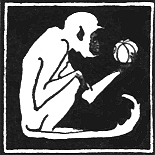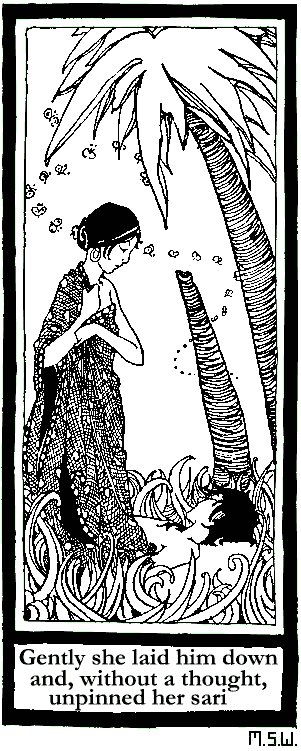 |  |
Wild at Heart Homepage | Contents | Previous Chapter
CHAPTER XIX
SUSPENSE
1

He was shattered. He was dead. Her doing.
That was her first thought. He had been coming to her from the first. Her prayer had been answered right enough; only, in her madness, she had despaired too soon. Doubtless he had seen her seeking the stream to make an end of herself, and had hurried down the cliff to save her. Save her!
Little incoherent moanings broke from her: “Brother, brother--open thine eyes. I cannot bear it if I have killed thee, I who called for thee in my need, and could not wait for thee to come. O brother, forgive...forgive...”
Desperately she wound her arms round him and lifted him up, putting out her lips to breathe life into his, drawing his head to hers; and thus she saw the blood.
Blood all over his back,--dried blood, caked blood,--as if he had lain all night in a bed of it. And oh, his wound!
Very nearly she let him fall, as a dreadful sickness surged through her at the horror of that cavernous gash in his shoulder, rimmed with blackened blood and oozing still. She reeled dizzily to her knees, jerking him forward, inert in her arms as he was, till the blood spouted afresh. For an instant she could do nothing, think of nothing. Then, with a sudden effort, she recovered herself.
He had been mauled, terribly mauled, by some wild animal. He had lain long in a pool of blood, dying perhaps, but not dead. Else, how had he started to come to her?
Even now he might not be dead! Oh, if she could save him now!

Instantly she forgot her sickness, her qualms. There was a wound, something quite tangible, that must be stanched, washed, tended. She must have water,...clear, pure water.
She saw what she must do: drag him, as best she could, to the stream, since she had no vessel for carrying water to him. Passive no longer, she was on her feet, fighting for his life, lifting, lugging, forcing him through the bushes to the waterside. The years of drudgery, of fetching and carrying, were standing her in good stead now; for, limp and heavy as he was, and awkward to handle because of his wound, she never flinched from the task, or, indeed, noticed the weight. She, who a few hours before had been too weary to drag her own limbs farther, gained the stream with this dead weight in her arms, and even then did not pause for breath.
Gently she laid him down and, without a thought, unpinned her sari. It was a single length of cloth, so cleverly adjusted as to drape her from head to foot, and without it she had no covering. But there was a wound to be washed, and nothing else at hand for the purpose. Modesty--strong in her, as it was, to the point of passion--must go by the board.
She had, indeed, no time to think of herself. It never occurred to her that she was naked as he was, as she tore the stuff into strips, turned him over on his face, and began her task. With the first strip she made a sponge and cleansed the great patch of blood on his back. Then, when that strip was sodden with blood, she used another, and yet another--quickly, lavishly--until the wound lay open and clean and she could see the track of fearful claws, bedded deep in his shoulder.
Tiger! Nothing else could have done it. A leap from behind in the dark, sudden, terrible--such was the fate of those who ventured on to the Ridge. If only she could have been with him, have warned him; for how could he, poor wanderer, know the menace of the Ridge? A miracle indeed that he had ever been allowed to leave it! And even now the terror might be following, lurking, watching for the chance of a second blow...
The thoughts flashed in and out of her brain, as she worked. She was too hard pressed to be afraid now, she who had quailed at the rustle of dewdrops but yesterday. Tiger or no, there was a wound to be bound, a life to be saved. She had no herbs, no soothing unguents, none of the salves that they used in the village for poisonous wounds--only water. But the water was clear and cool and pure. Surely it would have healing if she but used it with a will.
And with a will she used it. She was everywhere, it seemed, at once--now flying down the bank; now knee-deep in the pool, wringing out her strip; now darting to him, putting a pad in place, binding it quickly with new, dry strips; now, when the last strip was done, peering for the hundredth time into his face, with her anxious, wistful eyes, to see if he breathed, saying to herself that surely there must be some tinge in his cheek, some faint flutter of breath this time. Surely he must be a little nearer to life than when he had lain there all twisted and bloody!
But even when she had quite done, when she had bandaged him and composed him, with a pillow of grass for his shoulder and a tiny hillock to support his head, he lay as still as ever, as pale as ever.
Yet she had hope. Though he did not seem to be breathing, he was still warm. There was none of the chill, the ugly rigor of death. He lay as if he had fallen asleep for weariness. When she chafed his limbs, when she lay down beside him and gathered him against her, trying to clothe and cover him with her own warmth, he yielded and came to her--too easily, too limply, perhaps; nevertheless he yielded. Nor did he seem cold to her skin. Whereas the dead, she knew, were stiff and cold and strange to touch: little though she knew death, she knew that at least. The thought gave her courage. While he was warm, while he was limp, she would not think of death.
But it was hard, after so much activity, simply to sit down and wait for a sign of life. Before she had been quiet for two minutes, she was up again, fetching more water. This time she made a cup of her hands and dashed the water over his face, and a little into his mouth. After that, for another minute or two, she was content to watch him. Then, dissatisfied, she was once more on her feet and reproaching herself for her carelessness.
A pretty nurse she was, to have laid him in the shade when he needed all the warmth that he could get! What could she have been thinking of, when a few yards away there was all that life-giving sunlight waiting to steal over him and warm him back to life! Of course, of course he must lie in the sun! There was no healer in the world like sun.
Happy for the moment in doing something, she chose her place. He must lie where he seemed somehow to fit in, to belong--in the shelter of that ruin, rugged and beautiful as himself. There, by the doorway, sheltered from the breeze, yet full of the sun’s beam, he should lie till he awoke; and she--she must sit very quietly and be patient.
Gently she laid hold of him and dragged him over the grass. In the low archway she sat down, cross-legged, and took his head in her lap, even as she had taken it on the night of their meeting. Nor could she help remembering how on that other occasion she had smiled continually to her self, promising herself all sorts of joys when he should wake and see her face. And then--the tragedy of it!--when the time had come for waking, of her own accord she had left him and had set all this evil in train. She, she had brought him to this!
It was a cruel memory.
Her tears fell on his face.
2
Minute by minute the sun was gathering strength, steeping them in light and warmth. Fresh swarms of butterflies fluttered out momentarily to swell the cloud of blue, restless wings that wavered over their heads, and along the stream there were flashes of other bright wings where the gnats danced in a haze. Birds, shy at first, were taking courage at the restored stillness, and, careless of intrusion, were going about their daily business. Emerald parrots topped the wood and eddied, glinting, over their heads; a jungle cock, vivid in scarlet and gold, came and pecked in the grass for insects, round their very feet; and somewhere near, in the high leaves, green pigeons made the day drowsy with their sweet note.
Presently, too, the shade beyond the stream was mottled with soft, sleek, ruddy brown, as the deer passed in file to their resting-places, in and out of the sunlight.
All was peaceful. All was quiet. It was as if the garden were actually conscious of the removal of the common enemy and were shyly welcoming its champion home; while the outer world, too, echoed the deep content with that huge, vague, mysterious murmur of day, now swelling, now falling, like the sound of a sleepy sea.
Of all this, at first, Parmala noticed nothing; for the numbness of exhaustion was upon her, mind and body, and she could only feebly lift her hand ever and again to keep the flies from Nanga’s face, concentrating on that act as if it demanded all her powers. But little by little she was forced to take notice, till it was borne in upon her that these sounds, these flutterings, these coloured flashes of movement were but isolated signs of something great and growing and even triumphant; something that pulsed and droned and quivered everywhere: life.
Life, the very sense of the sun; she had never been aware before of what it meant. In Kotahbagh, in the hovels and the lanes of the bazaar, life had been at its best a feeble, limping, exiguous thing. But out here it was vast, it was infinite, shared by millions upon millions of unseen creatures. And yet--here lay the cruelty of it--she must first hear this tnumph-song in all its arrogance while she was fighting miserably for the one little particle of life, in all the millions, that mattered at all to her.
A sudden rage came to her. Life out here was too exuberant, too flagrant altogether. Those silly hordes of butterflies, brainless shapes infinitely multiplied--why should they have the spark which was being denied to him? What had they done, what had they suffered, to deserve their dancing and their bright wings and their joy of life? And whose would be the loss if she were to rise and strike them all down? She hated them. She hated all living things for the reason that they lived. She could have torn and trampled on those butterflies.
But the fierce mood passed when she looked down again at his face and saw in it the lines of pain and weariness, that seemed to mark out puny, miserable man from all creation. A terrible sense of fatality came to her. It seemed that out of all the riot of living creatures man alone was picked for suffering. What were they, he and she? What did they signify in all this monstrous revel of existence? They might perish here and now; their bones might whiten and grow green and finally melt away altogether into the fabric of this hot, sleepy, forgotten garden, and who would care?--who would know? The teeming life in the grass and the trees would still go on.
She had a sudden, nameless fear. To her fevered imagination the jungle seemed all at once to take sinister form and meaning, as something gigantic and enveloping and, above all, alive: a voice that muttered and threatened; a mighty mouth that swallowed puny lives; a great green pit with sides that scaled the sky. So real was her terror that she cowered down with a cry and hid her face in Nanga’s breast, pouring out her misery to him:
“O brother, wake! save me! It closes, it comes in. Wake, lest we be swallowed up!”
Then, as he did not stir, her voice sank to a whimper, breathed into his ear behind the curtain of her fallen hair:
“O brother, I am miserable. If thou couldst but hear my misery! I have only thee. See, I whisper, my lips at thy ear; I am thy beggar, asking alms of thee, and these are the tears of thy beggar.
“Brother, brother, the butterflies whirl and dance, and they have their loves; the birds make merry; the deer have all the forest. No beggars, these. Only I am the beggar; for thou wert all that I had; yet tears will not bring thee back to me...”
Then, passing from fear to yearning, absorbed in the thought of him:
“Brother, must we die?--we who are young, we who have scarcely known the taste of love? Have I done wrong, in that I have never learned thy name, or the sound of thy voice; and thou, in that thou hast taken no alms of me, though a beggar? Is love a king, kindly to likely lovers, wroth with laggard lovers? Because it was thy way to ask for nothing, and I...knew not how to give, must we lose all for that? For that must we die?”
And again, her voice breaking:
“Yet it is for that I love thee: because thou wert a beggar, yet didst take no alms; because thou didst come to the fire only to warm thy hands; because thou didst come to me, content to lay down thy head and to sleep. I care not. I care not; for that I love thee. Oh, there is none other in the world like thee!”
Suddenly she dropped, faint with the stress of her grief. Breath was denied her. The whole world seemed to be whirling about her head in great blotches of colour and sunlight against a background of fearful darkness. She had a queer sense of falling, as if the ground had suddenly slipped away, and she clutched wildly in the air to save herself.
Last, there came a sense, still more terrible, of losing him, and with all her failing powers she fought to keep him.
Then the darkness rolled up, and she lost touch with everything.